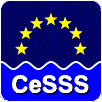Research focus of the Centre:
The most important topics of hydrodynamic research are: processes in the atmosphere-ocean
boundary layer; mass and energy exchange in the Nordic Seas and the Baltic Sea;
ocean circulation and climate.The biophysical studies concentrate on the optical
and acoustic properties of the shelf sea environment. The main deliverables of these
studies are mathematical models of solar radiation energy inflow to the sea,
its transfer and distribution in sea water, the underwater light and sound fields
and the influence of these fields on the marine biosphere. The main achievements
in the field of marine biodiversity are related to the ecology of the European Arctic
ecosystem and of sandy coasts in various climatic zones. Research into both ecologies
has been carried on in close international cooperation. Chemical studies focus
on the complex interactions between the abiotic components of the marine environment
and marine organisms, and on the influence of organisms on component cycles in sea water.
Marine genetics and biotechnology department has an extensive experience
in genetic analysis and laboratory biotechnology, and specialises in the study
of the biochemical and molecular mechanisms of species functioning in the marine environment.
Research
projects currently run in the Centre:
Surface waves break down as the source of marine aerosol fluxes; Bottom zooplankton -
unknown part of trophic chain in Arctic fjords; Methodology of acoustic determination
of gass bubbles in the Baltic; Satellite control of the Baltic marine ecosystem.
Quality:
The Institute's activity is concentrated on basic theoretical and experimental
marine research. Therefore, a substantial part of the Institute's scientific
achievements has been published in books and monographs or in prestigious
international journals. The Institute's staff have published 51 books and
monographs in English, Polish and Russian, many of them through renowned
publishing houses such as Elsevier, Springer-Verlag and World Scientific
Publications. The Institute's scientists have also served as members of
many international scientific organisations, committees and boards
(ie. IO C-UNESCO, Marine Board of the European Science Foundation,
the International Council for the Exploration of the Sea - ICES, EuroGOOS,
the Arctic Ocean Sciences Board and many others).
Equipment:
IO-PAS is the owner of the research vessel "OCEANIA". The r/v Oceania is at sea for
an average of 200 days per year and can take up to 15 scientists on board. The equipment
and deck machinery fulfils all requirements for field experiments, staff training
and instrument testing. The operational area routinely covers the Baltic Sea,
European Arctic Seas and Spitsbergen Fjords. Chemical, ecological and physical
laboratories are well equipped with a state of the art instrumentation.
The workshop offers space and a good instrumentation support for preparation
of the field cruises on r/v Oceania.
Human resources:
CeSSS is based on IOPAS; the largest oceanological Institute in Poland with
a staff of 175, including 24 full professors and associate professors,
and 42 scientists with a PhD degree (status on January 1, 2002).
Training possibility:
CeSSS Ph.D. centre offers a series of courses on marine physics, chemistry,
ecology and fishery to both Polish and foreign students. CeSSS provides ship-time
on the IOPAS's research vessel Oceania for co-operative research and sharing
the experience with EU ship operators.
Scientific co-operation:
IOPAS is very active on the international scene, participating in many scientific
projects and networking with numerous institutions in Western and Eastern Europe
and the United States. The Institute is
involved in three groups of large programmes:
- The World Climate Research Programme, which includes ACSYS,
CLIVAR and GEWEX.
- The International Geosphere-Biosphere Programme, which includes
LOICZ, ELOISE, BIODIVERSITY, BIODAFF, BIOMARE.
- International programmes focused on the Baltic Sea:
BALTEX-BRIDGE, DIAMIX, BOOS.
- European Union PF5 funded projects: COSA, MARBENA, PAPA, BIOCOMBE,
MISPEC, FISHCAL.
As a part of CeSSS activity, advanced workshops are planned for young
research scientists from Poland and other European countries.
 Centre of Excellence for Shelf Seas Science
Centre of Excellence for Shelf Seas Science
 Centre of Excellence for Shelf Seas Science
Centre of Excellence for Shelf Seas Science